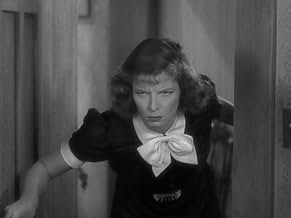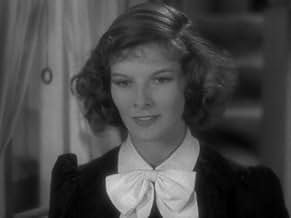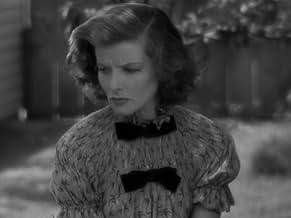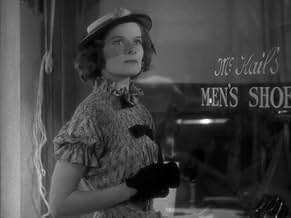AVALIAÇÃO DA IMDb
6,8/10
4,8 mil
SUA AVALIAÇÃO
Adicionar um enredo no seu idiomaA working-class girl is thwarted and embarrassed in her attempts to move up socially by her gauche family and unstable father.A working-class girl is thwarted and embarrassed in her attempts to move up socially by her gauche family and unstable father.A working-class girl is thwarted and embarrassed in her attempts to move up socially by her gauche family and unstable father.
- Direção
- Roteiristas
- Artistas
- Indicado a 2 Oscars
- 4 vitórias e 3 indicações no total
Hattie McDaniel
- Malena
- (as Hattie McDaniels)
Brooks Benedict
- Henrietta's Dance Partner
- (não creditado)
Harry Bowen
- Laborer Putting Up Sign
- (não creditado)
Steve Carruthers
- Party Guest
- (não creditado)
Monte Carter
- Waiter at Restaurant
- (não creditado)
George Ford
- Party Guest
- (não creditado)
Joe Gilbert
- Party Guest
- (não creditado)
Avaliações em destaque
I am NOT a fan of Katharine Hepburn....but I really like her in this film. I don't think she ever looked cuter and was more appealing. One often forgets the fresh face and beauty she had when she was young.
This film starts off wonderfully for 20 minutes, then bogs down a bit for an hour and then rallies brilliantly in the last 20 minutes. That last part is so good that made the film not only worthwhile to view but one to keep and watch every few years.
It bogs down when Hepburn starts her deceiving scheme and nervously yaks and yaks and yaks trying to impress her boyfriend (Fred MacMurray). The deceit involves her trying to hide her social status, something that must have meant a lot more back in the early '30s than it does today.
Critics comment about how the dinner scene is a "classic" and the highlight of the film, but I didn't think it was all that great, although Hattie McDaniel is funny. It's what happened afterward that made it a memorable film to me.
Although Hepburn and Fred MacMurray are the stars of this romance-comedy, Fred Stone almost steals the show. Playing Hepburn's dad in the film, he was both hilarious at times and very sad....and always interesting. He gives an unbelievably powerful speech to his boss near the end of this film.
Another plus for "Alice Adams" is the direction. This is early George Stevens, but just about any film that man directed is top-notch, including this one.
Without giving away what happens in the story, the film does present a nice message of forgiveness and reconciliation and sports one of the stronger feel-good endings I've ever seen on film. Hepburn's last words in the movie are "Gee Whiz!!" That bygone innocent reaction to MacMurray's comment that he loved her says a lot about how movies and times have changed.
This film starts off wonderfully for 20 minutes, then bogs down a bit for an hour and then rallies brilliantly in the last 20 minutes. That last part is so good that made the film not only worthwhile to view but one to keep and watch every few years.
It bogs down when Hepburn starts her deceiving scheme and nervously yaks and yaks and yaks trying to impress her boyfriend (Fred MacMurray). The deceit involves her trying to hide her social status, something that must have meant a lot more back in the early '30s than it does today.
Critics comment about how the dinner scene is a "classic" and the highlight of the film, but I didn't think it was all that great, although Hattie McDaniel is funny. It's what happened afterward that made it a memorable film to me.
Although Hepburn and Fred MacMurray are the stars of this romance-comedy, Fred Stone almost steals the show. Playing Hepburn's dad in the film, he was both hilarious at times and very sad....and always interesting. He gives an unbelievably powerful speech to his boss near the end of this film.
Another plus for "Alice Adams" is the direction. This is early George Stevens, but just about any film that man directed is top-notch, including this one.
Without giving away what happens in the story, the film does present a nice message of forgiveness and reconciliation and sports one of the stronger feel-good endings I've ever seen on film. Hepburn's last words in the movie are "Gee Whiz!!" That bygone innocent reaction to MacMurray's comment that he loved her says a lot about how movies and times have changed.
I had literally just completed my reading of Booth Tarkington's novel from which this movie was adapted before settling down to watch Katharine Hepburn star in the title role of this early George Stevens film.
It's a little creaky for sure as you might expect from an old 1935 feature and even if it does tack on a happy ending at variance with the original book, it would take a hard heart to seriously object to the upturn in Alice and her father's fortunes as things turn out.
The story of a sparky, pretty young girl brought up in rather straitened circumstances by her well-meaning but rather down-trodden parents, she is excited to be attending a high society party in the neighbourhood where maybe she can catch the eye of a handsome, wealthy young man who will elevate her from her life of comparative drudgery and give her the good life she craves. However, forced to wear an old dress long out-of-fashion and with no friends with whom to pal about, she's reduced to taking dances from the prize klutz and then playing wall-flower before she by chance meets up with poor little rich boy Arthur Russell played by Fred McMurray, apparently the fiancé of the wealthy deb holding the party but who sees past Alice's outer appearance to the good person within and promptly falls for her.
There are side plots involving Alice's rascally brother who eventually steals money from his employer, while her old dad, played by Fred Stone, employed at the same firm, is egged on by his henpecking wife on the pretext of improving Alice's prospects, to finally get out from his sinecure and set up a glue business in competition with his erstwhile employer, the vaunted big-man-in-town A J Lamb.
It all comes to a head when mum holds a big family dinner to formally meet and greet Arthur in a painfully excruciating scene where everything that can happen to embarrass the bold Alice duly does but just when it seems that poverty and ignominy awaits the family and that Alice may have to shock-horror go out and work for a living, along come two acts separate acts of charity and compassion at the end which transform all their fortunes, especially Alice's.
It's impossible to deny Alice her happy ending, so sympathetically and engagingly does Hepburn play the part. At this early stage in her career, some of her later irritating ticks and mannerisms are largely absent so that you really want things to turn out well for her. Likewise Fred Stone as her put-upon father, who finds his backbone in the end, even if his "Dang me!" protestations in that wheedling voice of his will likely set your nerves on edge. McMurray too is charming as the suave playboy who turns his back on his privileged but mean-spirited social equals for the love of poor but honest Alice.
One thing I didn't enjoy were the stereotypical demeaning parts given to black actors in the film, like seeing Hattie McDaniels as a slatternly hired-help but to be fair they are as written in the book, although if the producer could take the liberty to change the ending, it's just a pity they couldn't have done something similar with the casting of these parts.
Still, this was an enjoyable and entertaining mild-morality tale, made memorable mainly by Hepburn's bright performance in the title role.
It's a little creaky for sure as you might expect from an old 1935 feature and even if it does tack on a happy ending at variance with the original book, it would take a hard heart to seriously object to the upturn in Alice and her father's fortunes as things turn out.
The story of a sparky, pretty young girl brought up in rather straitened circumstances by her well-meaning but rather down-trodden parents, she is excited to be attending a high society party in the neighbourhood where maybe she can catch the eye of a handsome, wealthy young man who will elevate her from her life of comparative drudgery and give her the good life she craves. However, forced to wear an old dress long out-of-fashion and with no friends with whom to pal about, she's reduced to taking dances from the prize klutz and then playing wall-flower before she by chance meets up with poor little rich boy Arthur Russell played by Fred McMurray, apparently the fiancé of the wealthy deb holding the party but who sees past Alice's outer appearance to the good person within and promptly falls for her.
There are side plots involving Alice's rascally brother who eventually steals money from his employer, while her old dad, played by Fred Stone, employed at the same firm, is egged on by his henpecking wife on the pretext of improving Alice's prospects, to finally get out from his sinecure and set up a glue business in competition with his erstwhile employer, the vaunted big-man-in-town A J Lamb.
It all comes to a head when mum holds a big family dinner to formally meet and greet Arthur in a painfully excruciating scene where everything that can happen to embarrass the bold Alice duly does but just when it seems that poverty and ignominy awaits the family and that Alice may have to shock-horror go out and work for a living, along come two acts separate acts of charity and compassion at the end which transform all their fortunes, especially Alice's.
It's impossible to deny Alice her happy ending, so sympathetically and engagingly does Hepburn play the part. At this early stage in her career, some of her later irritating ticks and mannerisms are largely absent so that you really want things to turn out well for her. Likewise Fred Stone as her put-upon father, who finds his backbone in the end, even if his "Dang me!" protestations in that wheedling voice of his will likely set your nerves on edge. McMurray too is charming as the suave playboy who turns his back on his privileged but mean-spirited social equals for the love of poor but honest Alice.
One thing I didn't enjoy were the stereotypical demeaning parts given to black actors in the film, like seeing Hattie McDaniels as a slatternly hired-help but to be fair they are as written in the book, although if the producer could take the liberty to change the ending, it's just a pity they couldn't have done something similar with the casting of these parts.
Still, this was an enjoyable and entertaining mild-morality tale, made memorable mainly by Hepburn's bright performance in the title role.
I had heard of the famous Tarkington novel (but not read it) and had known that Katherine Hepburn won the Best Actress Oscar for this. So, I rented it.
It's just so moving. What I think some of the negative reviewers forget is just how much a girl's prospects in a small town in the 1920s are determined by whom she marries. For the intelligent, lively, vibrant, charming, warm-hearted Alice Adams - with a pitifully weak (but very sympathetic) and rather poor father, Alice's chance to "make anything" of her life is determined socially.
My heart ached with the snubs Alice receives - the routine unthinking cuts she receives at the hands of those from "better" families. Wearing a two year old dress with a corsage of violets illegally picked from the park, her loutish brother in his old beaten-up borrowed car as her date, she tries SO HARD to fit in - and doesn't because no one will let her. It's the most opaque of glass ceilings.
If you've ever felt (at a job, a party, a family gathering) that there was nothing you could do - no matter how hard you tried - to fit in - yet it was important that you did, you'll feel so much for this charming girl.
I do agree with others that the Arthur Russell part is underwritten.
But the movie boring? Not on your life. The painful moments are more difficult to watch than most war movies in which the protagonist is killed - because it is so well-done -
-- the pains of humiliation borne within, the disability one cannot hide, the old dress, the rude and outrageous relation, the thwarted eagerness - these are far more likely to be the painful moments in one's life (that one does not wish to remember) than any actual bullet wounds.
I love how the movie does not show a saintly Alice - she would love to snub others (e.g., the chubby boy at the dance), would love to parade before others in finery. yet her warmth toward her family - her essential sweetness, her strong frustrated yearning - are completely captivating.
We love this girl - and because of that, we love the movie.
It's just so moving. What I think some of the negative reviewers forget is just how much a girl's prospects in a small town in the 1920s are determined by whom she marries. For the intelligent, lively, vibrant, charming, warm-hearted Alice Adams - with a pitifully weak (but very sympathetic) and rather poor father, Alice's chance to "make anything" of her life is determined socially.
My heart ached with the snubs Alice receives - the routine unthinking cuts she receives at the hands of those from "better" families. Wearing a two year old dress with a corsage of violets illegally picked from the park, her loutish brother in his old beaten-up borrowed car as her date, she tries SO HARD to fit in - and doesn't because no one will let her. It's the most opaque of glass ceilings.
If you've ever felt (at a job, a party, a family gathering) that there was nothing you could do - no matter how hard you tried - to fit in - yet it was important that you did, you'll feel so much for this charming girl.
I do agree with others that the Arthur Russell part is underwritten.
But the movie boring? Not on your life. The painful moments are more difficult to watch than most war movies in which the protagonist is killed - because it is so well-done -
-- the pains of humiliation borne within, the disability one cannot hide, the old dress, the rude and outrageous relation, the thwarted eagerness - these are far more likely to be the painful moments in one's life (that one does not wish to remember) than any actual bullet wounds.
I love how the movie does not show a saintly Alice - she would love to snub others (e.g., the chubby boy at the dance), would love to parade before others in finery. yet her warmth toward her family - her essential sweetness, her strong frustrated yearning - are completely captivating.
We love this girl - and because of that, we love the movie.
I suppose that no one ever gave Alice Adams the sage advice that when one goes on a date with somebody, you should just "be yourself." But in the 1935 film "Alice Adams," Katharine Hepburn's title character is too busy trying to hide her humble background and put on hoity-toity airs, whenever she goes out shopping, to a party and especially when being courted, to EVER really be herself, and this desire to climb that social ladder only leads to embarrassing predicaments. This is actually a very charming film, and Hepburn, 28 here, looks extremely pretty, especially when given any number of beautiful close-ups by director George Stevens. The film boasts two wonderful and heartbreaking scenes: an early sequence at a ritzy dance, where wallflower Alice hugs the sidelines while pretending to no one in particular that everything is fine, and a late scene, in which the well-to-do young courter who has taken a fancy to her (nicely played by Fred MacMurray) suffers through a formal dinner with Alice's family in the middle of a heat wave. Hattie McDaniel (listed here as "McDaniels") almost steals this dinner scene as a slovenly, gum-chewing maid. Alice, despite her tendency to put on airs, is at heart a sweet girl (we see that in her relationships with her parents and brother), and the viewer is grateful that a young man is able to see beyond her B.S. and discern her finer qualities. But will upper-class Fred accept Alice, once he learns of her background? That, my IMDb'er friend, I urge you to find out for yourself...
This is an often under-rated film, and nowadays would certainly have been completely forgotten but for Katharine Hepburn's presence. As a satirical view of the 1920s filmed in the mid 1930s it feels somewhat dated. But not Hepburn's performance. This is is among the best of her RKO contract movies. Her innocence, her (modest) social pretension, her search for love, they all ring verosimilar - if not entirely true to life. And the celebrated window scene with tears and rain and sobs being one with Alice's feelings is far more than just 'clever'. Hepburn fans will like it. Others might very well follow along.
Você sabia?
- CuriosidadesThough Bette Davis won the 1935 Academy Award/Oscar for Perigosa (1935) beating out Katharine Hepburn in A Mulher que Soube Amar (1935), Davis was noted for saying more than once that she didn't deserve the award that year and that the one who did was Katharine Hepburn.
- Erros de gravaçãoWhen Alice walks with Arthur toward her house for the first time, a woman watering her shrubs can be seen and a letter carrier walks up, then back down her porch steps twice. The background scene repeats itself, letter carrier, woman setting down hose, etc. The letter carrier approaches Alice moments later where she then has to shamefully admit to Arthur that this is, indeed, her house that she is in front of. Likely a rear projection scene that was duplicated.
- Citações
Mrs. Adams: Malena fell down the cellar stairs!
Virgil Adams: Did she break any of our things?
- ConexõesFeatured in George Stevens: A Filmmaker's Journey (1984)
Principais escolhas
Faça login para avaliar e ver a lista de recomendações personalizadas
- How long is Alice Adams?Fornecido pela Alexa
- What was wrong with Alice's father? What was his illness?
Detalhes
- Data de lançamento
- País de origem
- Idioma
- Também conhecido como
- Alice Adams
- Locações de filme
- Empresa de produção
- Consulte mais créditos da empresa na IMDbPro
- Tempo de duração1 hora 39 minutos
- Cor
- Proporção
- 1.37 : 1
Contribua para esta página
Sugerir uma alteração ou adicionar conteúdo ausente

Principal brecha
What is the French language plot outline for A Mulher que Soube Amar (1935)?
Responda



































